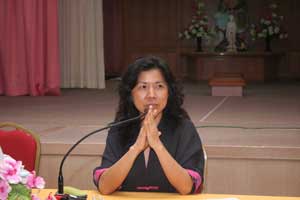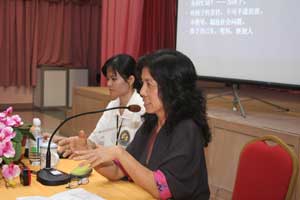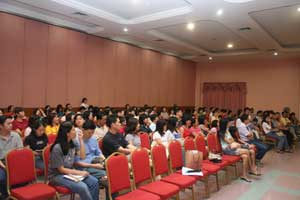Submitted by zhenliang on

“Physical touch is a form of love language we need to learn to communicate with children to make them feel loved. The type of future a child will have depends largely on the parents. The parents' responsibility in upbringing up a child properly is vital in ensuring the realization of a harmonious society. Western philosophers and psychologists generally believe that the character of a child begins to take shape prior to age four and the learning experience gained till then will inevitably influence the child's subsequent character development. Therefore a healthy parent-child relationship is of utmost importance in ensuring the development of a child's future character.”
The above statement was made in a parenting talk by Duola, a professional writer and painter, who attracted a capacity crowd of 200 at the Multi Purpose Hall of Than Hsiang Temple in the evening of 25th August. Widely acclaimed as one of the top ten Malaysian professional writers, according to a readership survey, Duola has to date 28 publications to her credit besides being winner of numerous literary awards, both local and foreign.
Currently a columnist in Nanyang Siang Pao, Pu Men Journal, Tzu Chi World Journal, Buddhist Digest, Fu Pao Quarterly and numerous other publications, Duola is also a committee member of the World Chinese Micro Novel Research Society, Malaysian Chinese Writer Association, Vice-Chairman of the Malaysian Chinese Cultural Society (Perak Branch) and editor of a series of Malaysian Chinese literature.
Duola further elaborated that parents should play the role of mentors to their children by providing them a conducive environment (good Feng Shui) in which to grow up in. A good Feng Shui here refers to a conducive environment for children to indulge in reading, playing and dialogue with parents to foster a closer and cordial parent-child relationship.
Duola quoted a family in Singapore who produced two prestigious presidential scholars. When asked the secret of the success of their children, the parents cited the following guidelines:
• i. Allocate sufficient time for play
• ii. Play time to be encouraged after school work
• iii. No watching of TV was allowed (According to a report by the American Psychology Development Journal, the influence of TV programmes is stronger and more lasting than one could imagine.)
• iv. No tuition was necessary
• v. Do not spare the rod.
She also emphasized on words that should never be used on children, such as calling them stupid and hopeless. Instead, parents should always speak words of affirmation and encouragement.
The talk ended at 9.45pm followed by a question and answer session. Many parents were seen busily checking some of the speaker's books on sale, and she gladly autographed them upon request.



